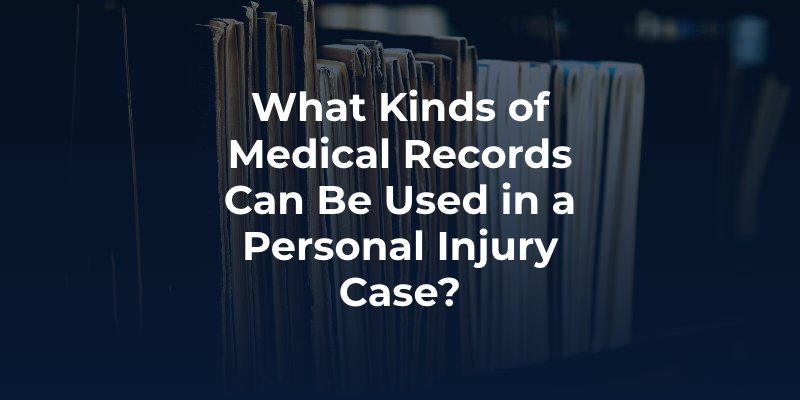When you’re hurt in an accident and file a personal injury claim, medical records become some of your most important evidence. These records are more than just doctor’s notes – they tell the story of your injury from the emergency room visit up through each appointment, treatment, and follow-up exam.
Medical records usually include things like test results, doctors’ observations, diagnoses, prescribed treatments, x-rays, and even physical therapy notes. Understanding their importance and how to use them effectively is essential for anyone injured by someone else’s negligence.

Types of Medical Records Used in Personal Injury Cases
When you file a personal injury claim, many different types of medical records can be used to support your case. These records help prove the extent of your injuries and their impact on your life.
Emergency Room Reports
These show the initial diagnosis and treatment given right after the accident. They record how seriously you were hurt at the scene and document the immediate actions taken by healthcare professionals, setting the foundation for your claim.
Hospital Records
This includes surgery summaries, intensive care notes, discharge instructions, and treatment plans. These files detail all major interventions, complications that might have arisen, and how closely you needed to be monitored during your stay.
Doctor’s Notes and Office Visit Records
These provide details on your pain, symptoms, and progress over time. Keeping track of follow-up appointments and your doctor’s observations helps show the long-term impact of the injury and whether your recovery is complete or ongoing.
Lab Results and Imaging
X-rays, MRIs, CT scans, and blood tests illustrate internal injuries or confirm diagnoses. With objective evidence from these tests, it’s easier to back up medical opinions and counter any claims that your injuries aren’t real or are being exaggerated.
Physical Therapy and Rehabilitation Notes
These document the steps of your recovery, limitations, and any ongoing needs. Progress reports and therapist assessments show how your injuries have affected your movement or daily life, and what still needs to improve.
Prescriptions and Medication History
These records reveal the number and types of drugs needed for pain or other problems following your injury. They also help show the severity or persistence of your symptoms, since some injuries require extended pain management or special medications.
Billing Statements and Invoices
Showing what you’ve paid (and may owe in the future) can help calculate your total damages. Medical bills provide actual dollar figures for care, hospitalizations, surgeries, therapy, and medications, showing exactly what you’ve had to pay.
Having a complete set of these records can make your personal injury claim much stronger and give a clear picture of what you’ve been through because of your injuries.
Your Case Will Get
The Attention It Deserves

How Medical Records Help Establish Liability
Medical records are a foundational part of building your personal injury case. Here’s how they establish liability:
- Linking the Injury to the Accident: Accurate medical records show that the injuries you have happened as a direct result of the accident, documenting things like when you sought treatment and how your injuries developed after the event.
- Documenting the Severity of the Injury: Doctors’ notes, imaging results, and treatment plans provide a clear picture of just how serious your injury is, which is essential to proving the accident had a significant effect on your life and wellbeing.
- Preventing Challenges to the Injury Claim: When medical documentation is complete and clear, it’s harder for the other side to argue that your injuries aren’t serious or aren’t connected to the incident. This evidence undermines any attempt to deny responsibility for your damages.
The Role of Medical Records in Calculating Damages
Your medical files help add up what the accident has actually cost you, both financially and personally.
- Quantifying Medical Expenses: Hospital records, bills, lists of medication, and therapy schedules provide solid numbers for both the care you’ve already received and what future treatments may cost, including operations, rehabilitation, or long-term care.
- Compensation for Pain and Suffering: Doctors’ notes mentioning ongoing pain, discomfort, or emotional strain make it possible for your attorney to argue for non-economic damages, showing how deeply the injuries have affected your quality of life.
- Lost Wages and Future Earnings: If a doctor puts in writing that you can’t work for days, weeks, or longer, it helps your case for lost income.


How Medical Records Can Influence Settlement Negotiations
When it’s time to negotiate with the insurance company, the strength and detail in your medical records can determine how your case is resolved. Insurers take your records seriously. Comprehensive documentation often means they’re more willing to settle at a fair amount while seeing evidence of your injuries and treatment.
If your files are full of proof, like scans, doctors’ statements, surgical notes, they present a clear picture of your condition. This detailed evidence demonstrates the real seriousness and long-term impact, justifying higher settlement amounts.


Common Mistakes to Avoid With Medical Records
Making the right choices about your medical records after an injury can have a big impact on your personal injury case. Here are some common mistakes you’ll want to avoid:
Not Keeping Detailed Records of Treatment
It’s easy to lose track of paperwork during recovery, but keeping copies of every medical record, test result, bill, prescription, and doctor’s note is important. Missing or incomplete records can make it harder to prove exactly what treatments you needed, which bill belongs to which visit, or how long your recovery took.
Failing to Follow Up on Prescribed Treatments
If your doctor tells you to go to physical therapy, take medicine, or schedule a follow-up appointment, do your best to attend each one. Skipping or delaying treatment lets the other side argue that your injuries were minor or that you didn’t actually need care, damaging your credibility and hurting your claim for compensation.
Inconsistencies Between Medical Records and Testimony
If you say your injury is serious, but your medical file doesn’t match your description, or you tell the insurance company something different than what’s in your records, it can create problems. Always be honest and clear with your doctors about your symptoms, and make sure what you say lines up with what’s in your paperwork.
Paying close attention to your medical records and how you manage your treatment can help keep your injury case on the right track. If you have any questions, don’t hesitate to contact us today to schedule a free consultation.





